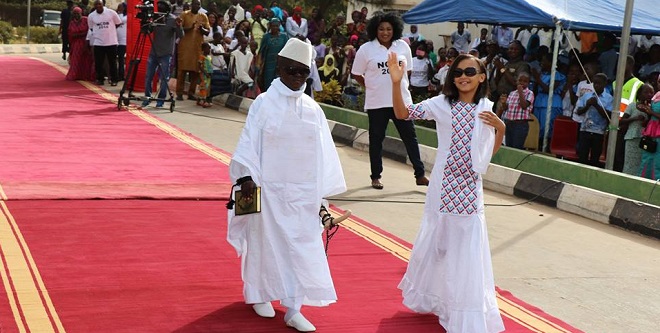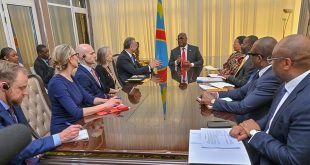
Banjul, Gambia | AFP |
Gambian President Yahya Jammeh, who was defeated in this week’s poll, seized power in a 1994 coup and clung to office for 22 years with a blend of severity, mysticism and iron-clad self-belief.
“No matter what people say about me, I am not moved… I don’t listen to anybody because I know what is important,” he said as he sought a fifth consecutive term at the helm of the small west African nation.
Governing, he said, “is between me and God Almighty.”
A deeply devout Muslim, Jammeh was born in the western village of Kanilai in 1965, the year that The Gambia, a long east-west sliver of land bordered by Senegal, gained independence from Britain.
His Excellency Sheikh Professor Alhaji Doctor Yahya Abdul-Azziz Jemus Junkung Jammeh Naasiru Deen joined the army in 1984 — his military title is the only one he has lost.
Ten years later, Jammeh mounted a coup with fellow army officers against Dawda Jawara, who had ruled the country since independence, pledging to root out corruption and hold elections.
After giving up his rank of colonel to allow him to contest elections as a civilian, Jammeh swept the vote in 1996, 2001, 2006 and 2011, following a 2002 constitutional amendment removing presidential term limits.
Rights abuses
Now 51, Jammeh has attracted worldwide attention for declaring The Gambia an Islamic nation, withdrawing the country from the International Criminal Court, and claiming he had concocted a herbal cure for HIV/AIDS.
The longtime ruler has woven a shroud of mysticism around himself using religion and rumours of secret powers.
Never seen without his Koran, sceptre and prayer beads, Jammeh’s billowing white robes are rumoured to hide a bulletproof vest, the legacy of several coup attempts by his own guards.
In the last few years, a crackdown on journalists, opposition figures and anyone deemed disloyal within the ruling Alliance for Patriotic Reorientation and Construction (APRC), has intensified.
He has promised to bury critics “nine feet deep” and told the UN Secretary-General to “go to hell” after Ban Ki-moon called for an investigation into an activist’s death in custody.
But in another moment he urged his supporters to restrain themselves from violence and allow this week’s election to go ahead peacefully.
Rights groups allege that those who defy him end up in the country’s notorious Mile Two prison, where the UN in 2014 said it had obtained evidence of torture and executions by the country’s National Intelligence Agency, which reports directly to Jammeh.
This was supplemented by “interference with the independence of the judiciary, denial of due process, prolonged pretrial and incommunicado detention,” Special Rapporteur Christof Heyns said.
“The security forces are his tools, and he uses them to control Gambia by arresting people who don’t share his views,” a prominent opposition figure told Human Rights Watch.
Isolated
Gambia’s diplomatic relations have also been precarious of late. In December 2014, the EU cut off €13 million of funding, and threatened to block another €150 million in response to the country’s poor human rights record.
International criticism followed the introduction of an “aggravated homosexuality” law in October 2014 that imposed life sentences for a series of new offences.
And the presidential vote this week was carried out without the presence of EU and ECOWAS observers.
Relations with neighbouring Senegal too are at an all-time low.
A huge increase on customs fees for trucks entering Gambian territory was put into place without warning in February, cutting the country off from vital supplies for months.
One Banjul-based diplomat told AFP that the blockade, the effects of a 2013 drought, and tourist fears of Ebola in a country that relies on sunseekers for up to 20 percent of its GDP, had made economic conditions unbearable for many Gambians.
Jammeh controls several businesses in the country and has in the past seized them without warning, discouraging foreign investment.
The state of the economy has pushed many young Gambians to take the “Back Way”, or migrant route across the Sahara to Libya, where they board boats bound for Italy.
But others remain grateful for investment in education and the health system, which were severely neglected under his predecessor.
“He has totally changed the life of the Gambian people,” said Yankuba Colley, a key Jammeh campaign organiser. “The future of The Gambia lies in his hands.”
 The Independent Uganda: You get the Truth we Pay the Price
The Independent Uganda: You get the Truth we Pay the Price



